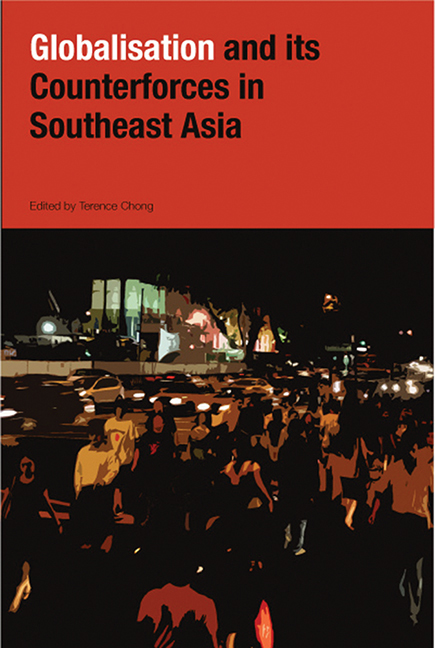Book contents
- Frontmatter
- Contents
- Foreword
- Preface
- The Contributors
- Introduction
- Part I The Political Contradictions of Globalization
- 2 Authoritarian States in Southeast Asia in Times of Globalization: Vietnam, Cambodia, Laos and Myanmar
- 3 From Plural Society to Political Pluralism in Malaysia
- 4 Indonesia's Role in the Long-term Prospects of ASEAN
- 5 Civil Society, Accountability and Governance in Thailand: A Dim Case of Participatory Democracy
- Part II Economic Regionalism and Global Influences
- Part III Local Security, Global Insecurity
- Part IV Social Processes: Arrested Development
- Part V Cultural Production in the Global Matrix
- Index
4 - Indonesia's Role in the Long-term Prospects of ASEAN
from Part I - The Political Contradictions of Globalization
Published online by Cambridge University Press: 21 October 2015
- Frontmatter
- Contents
- Foreword
- Preface
- The Contributors
- Introduction
- Part I The Political Contradictions of Globalization
- 2 Authoritarian States in Southeast Asia in Times of Globalization: Vietnam, Cambodia, Laos and Myanmar
- 3 From Plural Society to Political Pluralism in Malaysia
- 4 Indonesia's Role in the Long-term Prospects of ASEAN
- 5 Civil Society, Accountability and Governance in Thailand: A Dim Case of Participatory Democracy
- Part II Economic Regionalism and Global Influences
- Part III Local Security, Global Insecurity
- Part IV Social Processes: Arrested Development
- Part V Cultural Production in the Global Matrix
- Index
Summary
INTRODUCTION: INDONESIA AND THE DEVELOPMENT OF ASEAN
Indonesia is by far the largest member of ASEAN (Association of Southeast Asian Nations), both in terms of population size and geography. Indonesia'S population of 210 million is well over two-fifths of the total population of the ten Southeast Asian countries that now make up ASEAN, which currently stands at about 500 million. Geographically, Indonesia is the world'S largest archipelago, covering an expanse of area equivalent to the distance between Moscow and Istanbul. When ASEAN only consisted of five members, Indonesia made up two-thirds of ASEAN in terms of population. Given these attributes, it is generally accepted that Indonesia is an ambient power in Southeast Asia, whose policy towards and in the region, for better or for worse, help to influence and shape regional development. Equally important, happenings within Indonesia to a lesser or greater degree also have an impact on the immediate neighbouring countries.
This chapter has two subject matters, namely the long-term prospects of ASEAN and the role of Indonesia in this regional organization. Before one can begin to make prognosis of the future, however, it is clearly important to look at the past and the present, as these may provide indicators for future directions. The chapter is divided into three parts: Indonesia'S role in the early years of ASEAN; ASEAN'S achievements and challenges; ASEAN'S long-term prospects and the role of Indonesia in influencing its future directions.
Its colonial experience, as well as the struggle for nation and state building during the early days of independence, have shaped Indonesia'S foreign and defence policies till the present days. There are three central preoccupations of the Indonesian state, namely protecting the country'S hardwon independence, maintaining territorial integrity, and improving the people'S standard of living. Although the underlying influences and national impulses have basically remained the same, however, domestic priorities followed by different leaders over different time have resulted in quite different foreign policy formulations and implementation.
- Type
- Chapter
- Information
- Globalization and its Counter-Forces in Southeast Asia , pp. 76 - 96Publisher: ISEAS–Yusof Ishak InstitutePrint publication year: 2008

